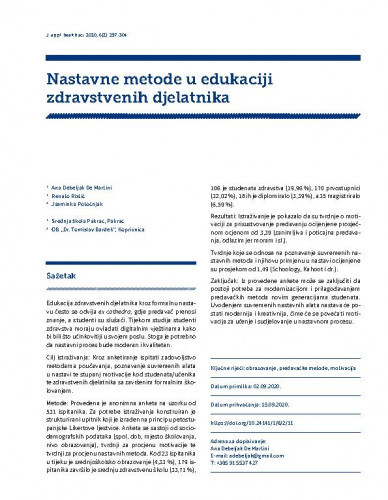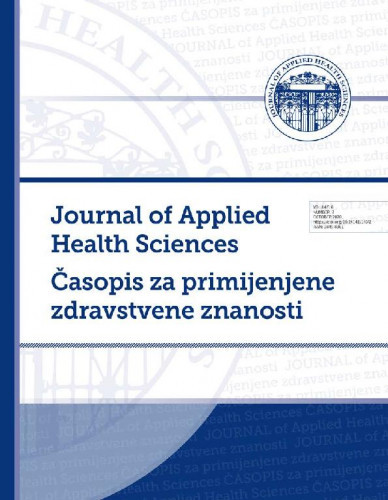Edukacija zdravstvenih djelatnika kroz formalnu nastavu često se odvija ex cathedra, gdje predavač prenosi znanje, a studenti su slušači. Tijekom studija studenti zdravstva moraju ovladati digitalnim vještinama kako bi bili što učinkovitiji u svojem poslu. Stoga je potrebno da nastavni proces bude moderan i kvalitetan. Cilj istraživanja: Kroz anketiranje ispitati zadovoljstvo metodama poučavanja, poznavanje suvremenih alata u nastavi te stupanj motivacije kod studenata/učenika te zdravstvenih djelatnika sa završenim formalnim školovanjem. Metode: Provedena je anonimna anketa na uzorku od 531 ispitanika. Za potrebe istraživanja konstruiran je strukturirani upitnik koji je izrađen na principu petostupanjske Likertove ljestvice. Anketa se sastoji od sociodemografskih podataka (spol, dob, mjesto školovanja, nivo obrazovanja), tvrdnji za procjenu motivacije te tvrdnji za procjenu nastavnih metoda. Kod 23 ispitanika u tijeku je srednjoškolsko obrazovanje (4,33%), 179 ispitanika završilo je srednju zdravstvenu školu (33,71%), 106 je studenata zdravstva (19,96%), 170 prvostupnici (32,02%), 18 ih je diplomiralo (3,39%), a 35 magistriralo (6,59%). Rezultati: Istraživanje je pokazalo da su tvrdnje o motivaciji za prisustvovanje predavanju ocijenjene prosječnom ocjenom od 3,39 (zanimljiva i poticajna predavanja, odlazim jer moram i sl.). Tvrdnje koje se odnose na poznavanje suvremenih nastavnih metoda i njihovu primjenu u nastavi ocijenjene su prosjekom od 1,49 (Schoology, Kahoot i dr.). Zaključak: Iz provedene ankete može se zaključiti da postoji potreba za modernizacijom i prilagođavanjem predavačkih metoda novim generacijama studenata. Uvođenjem suvremenih nastavnih alata nastava će postati modernija i kreativnija, čime će se povećati motivacija za učenje i sudjelovanje u nastavnom procesu.; Education of healthcare workers through formal teaching is often conducted “ex catedra”, where the lecturer conveys the knowledge while students are the listeners. During the course, healthcare students have to overmaster digital skills in order to be as efficient as possible in doing their work. Due to that, the teaching process needs to be modern and of good quality. Aim of the research: Contentment with the teaching methods, proficiency with the contemporary tools in teaching process, as well as the level of motivation of students and healthcare workers with completed formal education, have to be examined through surveys. Methods: An anonymous survey was conducted among 531 examinees. For the purpose of the research, structured questionnaire was constituted. It was created according to the principle of the 5-point Likert scale. The survey consists of social-demographic dates (gender, age, place of education, level of education), statements for estimating the motivation, as well as statements for evaluating teaching process. 23 examinees are still in the process of high school education (4,33%), 179 examinees completed medical high school (33,71%), 106 examinees are students who still attend faculty of medicine (19,96%), 170 examinees are bachelors (32,02%), 18 examinees graduated (3,39%) and 35 examinees won a master’s degree (6,59%). Results: The research has shown that claims about motivation regarding lecture attendance have been graded with an average mark 3,39 (interesting and encouraging lectures, I attend because I have to etc.) Claims concerning proficiency with the contemporary tools and their appliance in the process of teaching have been graded with the average of 1,49 (Schoology, Kahoot and others.) Conclusion: From the conducted survey, there could be drown a conclusion that there exists the necessity for modernisation and adjustment of the teaching methods concerning new generations of students.
Sažetak

 Journal of applied health sciences : Časopis za primijenjene zdravstvene znanosti : 6,2(2020) / glavni urednik Aleksandar Racz
Journal of applied health sciences : Časopis za primijenjene zdravstvene znanosti : 6,2(2020) / glavni urednik Aleksandar Racz